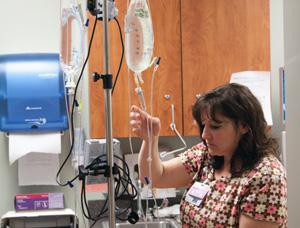
By Barb Arland-Fye
Health care for the uninsured is ‘“too little too late,’ leading to severe and costly conditions,” says Donna Oliver, president and CEO of Mercy Medical Center-Clinton. “We all pay a price as inefficient charity care is shifted to our premiums. It is in our common interest to get everybody covered and served more efficiently.”
Mercy in Clinton — one of three Catholic hospitals in the Diocese of Davenport — allocated $2,109,111 in charity care in fiscal year 2009. That compares with $1,674,447 in charity care for fiscal year 2008, a 26 percent increase from 2008 to 2009, said Julie Dunn, the medical center’s public relations specialist.
At Mercy Medical Center in Centerville, “our charity care and bad debt was $2.3 million for fiscal year 2009. In 2008, charity care and bad debt was $1.8 million, a one-half-million-dollar increase over the previous year,” said Vice President Ann E. Young.
“It is particularly challenging for Catholic hospitals when mission is the driving force behind what we do, but the financial reality is that we have to be viable in for that mission to continue into the future,” Young said.
At Mercy Iowa City, charity care totaled $1,161,376 for fiscal year 2009. That’s a slight decrease from the $1,174,728 in charity care the hospital provided in fiscal year 2008, said Denice Connell, the hospital’s marketing and communications director. A variety of factors contributed to the higher expenses in 2008, most significantly, catching up with a backlog of applications for charity care. “We do not have a ceiling on the amount of charity care we give,” Connell added.
“Like Catholic health care providers across the country, Mercy Iowa City is committed to health care reform that would do two things: improve the health status of our communities and provide compassionate care that works for everyone, regardless of their income, age, or employment status.
“We believe that Iowa’s example of high quality, high value health care has lessons for the health care reform debate, and we believe that we can also learn from other countries’ health care systems. Mercy is following the debate closely but is not endorsing any particular bill at this time,” Connell said.
Oliver, who has advised Congressman Bruce Braley of Iowa on healthcare issues, identifies four goals for reform: Include everyone, coordinate care for better outcomes, eliminate redundancy and increase quality, and shift the focus from avoiding risk to increasing value. Oliver believes that savings nationwide could be achieved over the long run if health care reform includes incentives for providers and/or geographic regions that demonstrate a combination of high quality and low costs.
“As across-the-board cuts in Medicare payment are implemented as part of reform, places like Iowa will be disproportionately impacted because they have fewer uninsured than many states and will see less new revenue as coverage is expanded,” Oliver said.
“This disproportionate impact would be mitigated, however, if reform includes payment incentives that reward high value (cost combined with quality) while somehow addressing wide disparities in Medicare payment from one state to the next. More importantly, a ‘value’ incentive would begin to move other providers toward more efficient care, thereby helping to “bend the cost curve” for the nation.”








